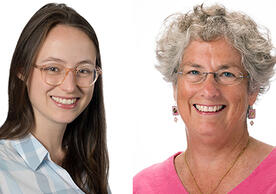
Congratulations to Halley Ruppel ’18 PhD and Marjorie Funk ‘84 MSN, ‘92 PhD, whose study on “Testing physiologic monitor alarm customization software to reduce alarm rates and improve nurses’ experience of alarms in a medical intensive care unit” has been published in the peer-reviewed open access journal PLOS ONE. The study was conducted in the medical intensive care unit at Yale New Haven Hospital with YNHH nurses Laura De Vaux and Dawn Cooper. It was funded by Philips Medizin Systeme Böblingen GmbH, Böblingen, Germany.
The study is an example of an academia-practice-industry collaboration, and is one of a limited number of studies that has tested an intervention to reduce the number of clinically irrelevant alarms on hospital units. Although the purpose of alarms is to enhance safety, they have themselves become an urgent patient safety concern. Numerous false and clinically irrelevant alarms lead to alarm fatigue, or desensitization to alarms among clinicians, which can result in missing important alarms or a delayed response to these alarms. Alarm fatigue has caused harm to patients, and even resulted in death.
Halley received her PhD in Nursing from Yale, where she was a Robert Wood Johnson Foundation Future of Nursing Scholar and received the Anthony DiGuida Delta Mu Research Prize at Commencement. Her dissertation was a mixed methods study that addressed customization of physiologic monitor alarm settings in intensive care units. She is currently a post-doctoral fellow at Kaiser Permanente Northern California in the Division of Research Delivery Science.
Marge retired this past June from Yale School of Nursing after 34 years of service. Her research centered on the wise use of technology in the care of critically ill patients. In addition to alarm fatigue, her recent research addressed electrocardiographic monitoring.
PLOS ONE is a peer-reviewed open access scientific journal published by the Public Library of Science since 2006. The journal covers primary research from any discipline within science and medicine.
